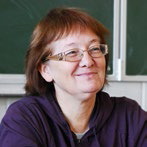Journalism in North-Caucasus Federal University
Bachelor’s program
Institute of Humanities,
Department of Journalism

Olga LEPILKINA,
Head of the Department
Tel. +7 8652 33-01-90, ext. 4250
E-mail:info@ncfu.ru
Achievements. The program successfully underwent state accreditation in 2020. Every year the institute holds international conferences Media Readings at NCFU and contests for young media researchers. The institute established a specialized TV and radio journalism department in cooperation with STRBC Stavropolye. There is a well-established system of working with gifted young people: the RAS basic school – Inform-C student scientific society – participation in journalistic and research contests.
Teaching staff. Training is provided by 42 teachers. Over 30% of them are staff members of regional mass media. Russian and German researchers are also engaged in the teaching process.
Facilities and resources. The program is delivered using facilities and resources of the training TV and radio studio, the university's Stavropol Journalism History Museum, the infrastructure of STRBC Stavropolye.
Research. The research area is "Evolvement and Current Status of Provincial Journalism," the laboratory "Regional Media Space," the teaching staff carries out expert and advisory activities.
Education. The department trains highly qualified journalists for mass media of the region and Russia. Teachers use advanced technologies of project- and problem-based learning. Bachelor students learn to create the content for mass media in various genres and formats; analyze, assess and edit media texts; carry out author activity taking into account specific features of various mass and other media and global and Russian experience; carry out editorial activity according to language standards, formats, genres, styles, technology requirements of various mass and other media; participate in developing and implementing individual and (or) collaborative journalism projects; create the information content covering events, phenomena, facts and intended for dissemination using corporate media, printed mass media and new media as well as TV and radio.
Strategic partners. EJTA, the Union of Journalists of Russia, the National Association of Mass Media Researchers, regional and federal mass media.
International projects and programs. Participation in projects of EJTA, University of Hamburg (Germany), the Armenian-Russian research laboratory “A Dialogue of Cultures in Literature and Media Space,” professional internships for students in European mass media.
Competitive advantages. Professional-public accreditation, state-of-the-art facilities and resources, close cooperation with mass media, high employment rate, recognition of the departments' educational activity by the regional and Russian journalistic community.